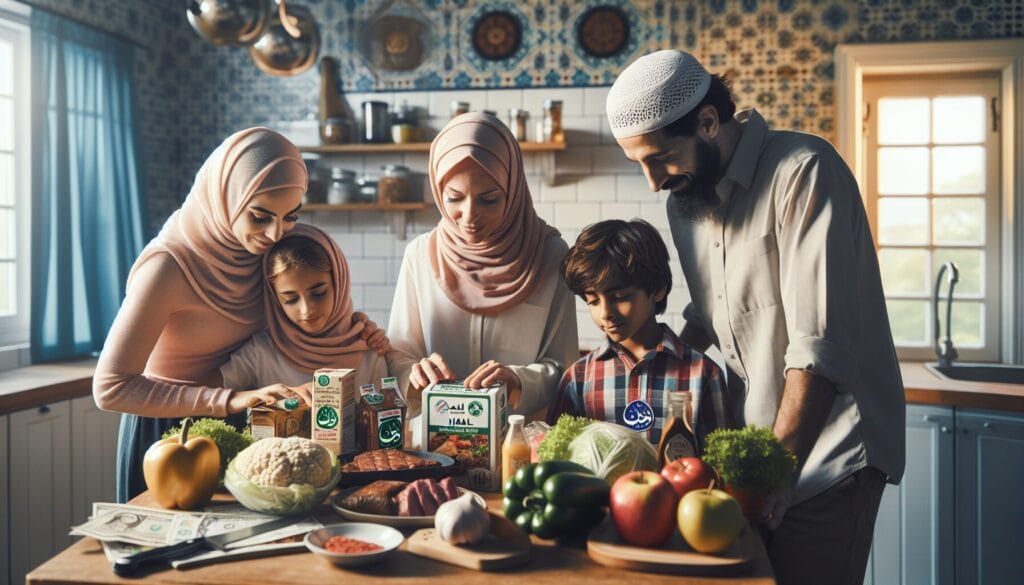Oh, planning halal meals! I remember the first time I tried my hand at it. It was for a potluck with a dear friend who follows a halal diet. I was so eager to impress but ended up making a few blunders along the way. You see, understanding halal isn’t just about avoiding pork or alcohol. It’s a whole lifestyle! For those of us in the United States, it might feel like a challenge at first, but trust me, it’s a rewarding culinary journey. Whether you’re exploring this for yourself or hosting friends, getting it right is important. However, there are some common mistakes when planning halal meals that can trip you up if you’re not careful. So, let’s dive into the essentials and make your meal planning a breeze!
A Note on Halal Integrity
Ensure that all ingredients and preparation methods strictly adhere to halal standards to avoid inadvertently consuming non-halal substances. Cross-contamination with non-halal foods can compromise the meal’s integrity, so maintain separate utensils and preparation areas.
1. Overlooking Halal Certification on Ingredients

When you’re planning to whip up a delicious halal meal, it’s easy to get caught up in the excitement of flavors and forget to check if your ingredients are halal-certified. It’s a common oversight but super important to make sure your meal is genuinely halal. Overlooking halal certification can be a bit of a slip-up that might catch you off guard, especially when you’re trying to cater to family or friends who follow a halal diet.
Many products in the United States may not have a halal label, even if they seem okay. So, what should you do? First off, always check the packaging for a halal certification symbol. This symbol is like a trusty badge that confirms the product meets halal standards. Organizations like Islamic Food and Nutrition Council of America and Halal Food Council USA are reliable sources of certification. They’ve got you covered with their meticulous standards.
Here are a few handy tips to avoid this common mistake:
- Do Your Homework: Before you hit the grocery store, list down brands that carry halal-certified products. You’ll save time and ensure peace of mind.
- Ask the Experts: If you’re unsure, don’t hesitate to ask store employees. Many are trained to help you find what you’re looking for.
- Online Resources: Use the power of the internet! Websites and apps often list halal-certified products available in the United States.
- Read Labels Carefully: Some ingredients might be hidden under technical names. Familiarize yourself with these to avoid any surprises.
Additionally, be wary of processed foods. They often contain hidden animal-derived ingredients, like gelatin or certain emulsifiers, that aren’t always obvious. Therefore, a quick check on the label can prevent any slip-ups. If you’re dining out, don’t shy away from asking the restaurant staff about their sourcing. Many dining establishments in the U.S. are becoming more conscious of halal requirements, especially in diverse areas.
Remember, a little diligence goes a long way in crafting a meal that’s both delicious and respectful of dietary needs. By checking for halal certification, you’re ensuring that everyone at your table can enjoy the meal without any worries. Trust me, it’s worth the extra step!
2. Confusing Halal with Other Dietary Restrictions
Confusing halal with other dietary restrictions is a mistake that’s pretty common, especially if you’re new to planning meals with specific guidelines in mind. It’s something I’ve seen happen often, and it can lead to a bit of a culinary conundrum. While halal is rooted in religious observance, other dietary restrictions might stem from health choices or ethical beliefs. Understanding the differences is key to avoiding any mix-ups at your next dinner party.
When planning halal meals, it’s crucial to note that halal doesn’t necessarily mean vegetarian, vegan, kosher, or gluten-free. Each dietary restriction has its own unique set of rules. For instance, a dish might be vegetarian, yet still not halal if it contains alcohol, which is prohibited in halal diets. Similarly, while kosher and halal share some similarities, such as specific slaughter processes, the two aren’t interchangeable. Kosher laws come from Jewish tradition, while halal is based on Islamic guidelines. It’s essential to check the certification symbols carefully to ensure compliance with halal standards.
Common Dietary Confusions
To navigate these waters effectively, here are a few common scenarios where halal might be confused with other dietary restrictions:
- Alcohol-free doesn’t always mean halal: Even if a dish doesn’t contain alcohol, it might include other non-halal ingredients like certain animal-derived products.
- Vegan is not automatically halal: Although vegan diets exclude animal products, some additives or processing aids might not adhere to halal standards.
- Gluten-free doesn’t imply halal: Gluten-free products might still contain non-halal ingredients like gelatin derived from non-halal sources.
To ensure your meal planning is on point, it’s helpful to collaborate with reputable halal certification bodies like Islamic Food and Nutrition Council of America or Halal Food Council USA. They provide clear guidelines and certifications that can help you navigate the intricacies of halal diets. Additionally, when hosting a diverse group, it’s always a good idea to inquire about specific dietary needs. This way, you can create a menu that respects everyone’s preferences and beliefs.
If you’re feeling overwhelmed, don’t worry. There’s plenty of support available to help you get it right. Our resource on practical halal meal planning for busy families offers valuable insights and tips, ensuring you cater to your guests’ needs without a hitch.
3. Neglecting Cross-Contamination Risks in the Kitchen
Cross-contamination in the kitchen can be a sneaky culprit when planning halal meals. Imagine this: You’ve carefully selected your ingredients, ensured they’re halal-certified, and you’re excited to cook a delicious meal. However, without proper attention, your efforts might unravel if cross-contamination occurs. This happens when non-halal substances come into contact with halal foods, potentially rendering them non-halal.
One common mistake when planning halal meals is using the same cutting boards or utensils for both halal and non-halal foods. It’s kind of like using the same paintbrush for two different colors—you end up muddying both. To prevent this, have dedicated utensils and cutting boards for halal foods. Color-coding them can be a helpful trick to avoid mix-ups.
Also, let’s talk about the fridge. It’s easy to overlook, but storing halal and non-halal items together without proper separation can lead to issues. Use dedicated shelves or bins to keep them apart. This simple step ensures that your halal ingredients remain pure and untouched by anything non-halal.
Additionally, be mindful of the appliances you use. For example, using the same toaster for halal and non-halal bread can lead to cross-contamination. Consider having separate appliances or at least thoroughly cleaning them between uses. Remember, it’s all about maintaining the integrity of the halal status.
Simple Steps to Avoid Cross-Contamination
- Segregate utensils and tools: Keep separate sets for halal cooking.
- Dedicated storage: Use different shelves or bins in the fridge.
- Thoroughly clean shared appliances or have separate ones.
- Be mindful during meal prep and cooking.
Moreover, educating everyone in the household about these practices is vital. If you share your kitchen with others, ensure they understand the importance of avoiding cross-contamination. Organizations like Islamic Food and Nutrition Council of America and Halal Food Council USA offer guidance and resources to help keep your kitchen halal-compliant.
By being proactive and attentive, you can ensure your meals stay halal and delicious. It’s all about being cautious and taking those extra steps to maintain the purity and integrity of your cooking practices.
4. Forgetting to Verify Restaurant Halal Compliance

Verifying that a restaurant is halal-compliant can sometimes feel like detective work, but it’s an essential step when planning halal meals. Imagine heading out for dinner, your taste buds all set for a delicious meal, only to discover the restaurant isn’t halal-compliant. It’s disappointing, right? Avoiding this common pitfall requires some proactive steps.
First, always check for a halal certification symbol before you dine. While you might be familiar with the ones from Islamic Food and Nutrition Council of America or Halal Food Council USA, remember that not every restaurant displays these prominently. Don’t hesitate to ask the staff about their halal status. A simple question like, “Is your meat halal-certified?” can save you a lot of hassle. If they’re unsure or hesitant, it might be a red flag.
Additionally, many restaurants, especially in the United States, have online menus and details about their certification. A quick visit to their website or a call can provide clarity. Some places may even share their certification on platforms like Yelp or Google Reviews. However, remember that online information can sometimes be outdated, so it’s always best to double-check with the establishment directly.
Tips for Verifying Halal Compliance
When ensuring a restaurant adheres to halal standards, consider these steps:
- Visit the restaurant’s website for their certification details.
- Call ahead and inquire directly about their halal practices.
- Look for visible halal certification symbols in the restaurant.
- Check reviews on trusted platforms for mentions of halal compliance.
- Engage with the staff to understand their sourcing and preparation methods.
Furthermore, cross-contamination is a concern even if a restaurant claims to serve halal food. This means ensuring that halal foods are not mixed with non-halal items during preparation. Ask about their kitchen practices and whether they keep halal and non-halal ingredients separate. Restaurants like The Halal Guys or Nando’s are known for their transparent practices, often making it easier to trust their compliance.
As you navigate dining options, remember that vigilance is key in avoiding common mistakes when planning halal meals. With a bit of effort and these tips in hand, you can enjoy a meal that aligns with your dietary needs and beliefs. Bon appétit!
5. Mismanaging Time for Proper Meal Preparation
Time management is the backbone of any successful meal planning, and it’s especially critical when you’re focusing on halal meals. Mismanaging your time can lead to a cascade of issues that might compromise the dietary standards you’re aiming to uphold. With a bit of planning and awareness, you can avoid these pitfalls and enjoy a smooth cooking experience.
One of the first things to keep in mind is the time needed for sourcing ingredients. Whether you’re shopping at your local grocery store or a specialized halal market, like those certified by Islamic Food and Nutrition Council of America or Halal Food Council USA, it’s essential to account for the time it takes to ensure all items meet halal standards. Rushing through this step can lead to accidental purchases that don’t align with your dietary needs.
Once you’ve got your ingredients, preparation is the next big step. Halal meals often require specific preparation methods to ensure compliance with dietary laws. For instance, marinating meat can be a time-intensive process, sometimes requiring several hours or even overnight. Proper marination not only enhances flavor but also ensures that the meat is tender and enjoyable. If you underestimate this time, you might end up serving a meal that’s less than ideal.
Effective Scheduling Techniques
Here are some tips to help you manage your time effectively when planning halal meals:
- Plan Ahead: Set aside a specific day for meal prep. This helps you avoid last-minute rushes and ensures you have all necessary ingredients on hand.
- Batch Cooking: Prepare larger quantities of food that can be stored and used throughout the week. This can save time on busy days.
- Set Timers: Use timers for each cooking step. This prevents overcooking and helps you keep track of multiple dishes at once.
Another critical element is understanding your kitchen equipment’s role in time management. A slow cooker or pressure cooker can be a game-changer, allowing you to cook meals over several hours without constant supervision. This is particularly useful for dishes that require tenderizing or long simmering times.
Additionally, don’t forget about the time needed for cross-contamination prevention. Cleaning surfaces and utensils between different stages of meal prep is crucial. This practice not only maintains the integrity of your halal meal but also ensures overall food safety.
Remember that cooking should be an enjoyable process, not a race against the clock. By organizing your time effectively, you can create delicious, halal-compliant meals without the stress. Enjoy the process, and your meals will surely reflect the love and care you’ve put into them.
Conclusion
Ultimately, successfully planning halal meals is about understanding and respecting dietary practices while avoiding common pitfalls like overlooking certifications, confusing dietary restrictions, and neglecting cross-contamination risks. By dedicating time to research, preparation, and vigilance, you ensure a rewarding culinary experience that caters to halal standards and brings joy to your table. Embrace the journey with enthusiasm and care, and your efforts will be richly rewarded. Enjoy your culinary adventures!
Frequently Asked Questions
Why is halal certification important when planning halal meals?
Halal certification is crucial because it ensures that the ingredients used in your meal comply with Islamic dietary laws. This certification acts as a confirmation that the product meets halal standards, thereby providing peace of mind to those following a halal diet. Overlooking this aspect could mean unintentionally using non-halal ingredients, which can be particularly concerning for individuals who strictly adhere to halal guidelines.
How can I prevent cross-contamination in my kitchen while preparing halal meals?
To prevent cross-contamination, it’s important to use dedicated utensils and cutting boards for halal foods, and consider color-coding them to avoid mix-ups. Additionally, store halal and non-halal items separately in the fridge using dedicated shelves or bins. Be mindful of appliances, like toasters, that could cause cross-contamination, and educate everyone in the household about these practices.
What steps should I take to verify if a restaurant is truly halal-compliant?
To verify a restaurant’s halal compliance, check for halal certification symbols on their premises or online platforms. It’s also a good idea to call ahead and ask directly about their halal practices, including their sourcing and preparation methods. Reading reviews on trusted platforms can offer additional insights, but it’s always best to confirm directly with the restaurant to ensure the information is current and accurate.
Fatima Ansari is an Islamic educator and writer with over a decade of experience teaching Quran and Islamic studies to children and families in Western Muslim communities. Growing up in North America, she saw firsthand the challenges Muslim families face in balancing faith with modern life, which inspired her to share practical guidance rooted in the Quran and Sunnah. Her mission with E-Quran Learning is to make Islamic education accessible, relatable, and inspiring for Muslim families across the United States, United Kingdom, Canada, Australia, and New Zealand.






